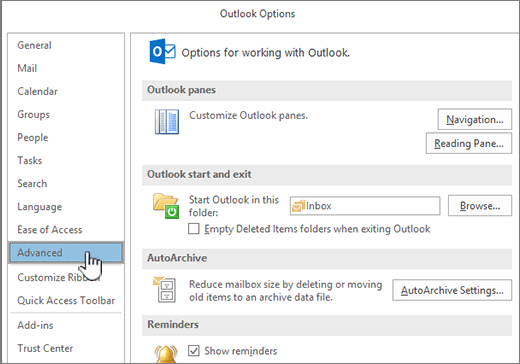You can use the same contacts in both Google Gmail and Outlook, without adding them manually to both locations.
Import your contacts from Google Gmail to Outlook
-
Log on to Google Contacts.
-
In the left column, click More.
-
At the top left, click More.
-
Click Export.
-
Under Which contacts do you want to export, click a contact group or All Contacts).
-
Under Which export format, click Outlook CSV (for importing into Outlook or another application).
-
Click Export.
-
When prompted to download the export file, click Save.
-
Choose a location on your computer to temporarily save the file. The default file name is contacts.csv.
Note: You can delete this file after your contacts are imported into Outlook.
-
Click Close.
-
Go to Outlook.
-
Click the File tab.
-
Click Open.
-
Click Import.
-
Click Import from another program or file, and then click Next.
-
Click Comma Separated Values (DOS), and then click Next.
-
In the Import a File box, browse to find the file you downloaded in step 9, and then double-click the file.
-
Click one of the following:
-
Replace duplicates with items imported
-
Allow duplicates to be created
-
Do not import duplicate items
-
-
Click Next.
-
In the folder list, click the contacts folder where you want the imported contact information to go, and then click Next.
-
To add or remove fields to determine the way the contact information is saved in the new imported file, click Map Custom Fields.
Note: The Map Custom Fields button in the Import a File dialog box might not be available when you try to import data from another program or file. In the The following actions will be performed box, select the Import check box, and then the Map Custom Fields button is available.
Additional help on mapping custom fields
-
In the From box, drag the field that you want to convert onto the Outlook field that is listed in the To box.
Note: The Name field doesn't appear in the To box because Outlook reserves the first row of a named range for field names. If the range that you import does not contain field names, the first row of data will be interpreted as field names and will not be imported as data. To make sure that all of the data in the named range is imported, use the first row for field names.
-
To see additional records in the From box, click Previous or Next.
-
To remove all mapping, click Clear Map.
-
To reset the original mapping, click Default Map.
-
-
To display additional fields in the To box, click the plus sign (+) next to the field. For example, to display the Business Street and Business City fields, click the plus sign (+) next to Business Address.
-
-
Click Finish.
Export your contacts from Outlook to Google Gmail
Before you export contacts from Outlook, it is helpful to understand the difference between the Outlook Address Book and Outlook Contacts. Both are part of Outlook. However, the Address Book is a compilation of the different address lists that you might store in Outlook, such as LDAP Internet directories, the global address list (GAL), or other third-party address books. Contacts is only one of the address lists included in an Address Book. Only contacts can be exported directly from Outlook to Google Gmail.
-
Click the File tab.
-
Click Options.
-
Click Advanced.
-
Under Export, click Export.
-
In the Import and Export Wizard, click Export to a file, and then click Next.
-
Click Comma Separated Value (DOS), and then click Next.
-
In the folder list, click the contacts folder you want to export, and then click Next.
-
Choose a location on your computer to temporarily save the file.
Note: You can delete this file after your contacts are imported into Google Gmail.
-
Type a name for the exported file, and then click Next.
-
To add or remove fields to determine the way the contact information is saved in the new imported file, click Map Custom Fields.
Note: The Map Custom Fields button in the Export to a File dialog box might not be available when you try to import data from another program or file. In the The following actions will be performed box, select the Export check box, and then the Map Custom Fields button is available.
Additional help on mapping custom fields
-
In the From box, drag the field that you want to convert onto the Outlook field that is listed in the To box.
-
To see additional records in the From box, click Previous or Next.
-
To remove all mapping, click Clear Map.
-
To reset the original mapping, click Default Map.
-
-
To display additional fields in the To box, click the plus sign (+) next to the field. For example, to display the Business Street and Business City fields, click the plus sign (+) next to Business Address.
-
-
Click Finish.
-
Log on to Google Contacts.
-
At the top left, click More.
-
Click Import.
-
Under Import Contacts, click Browse.
-
Select the file you exported in step 9, and then click Open.
-
Click Import.












